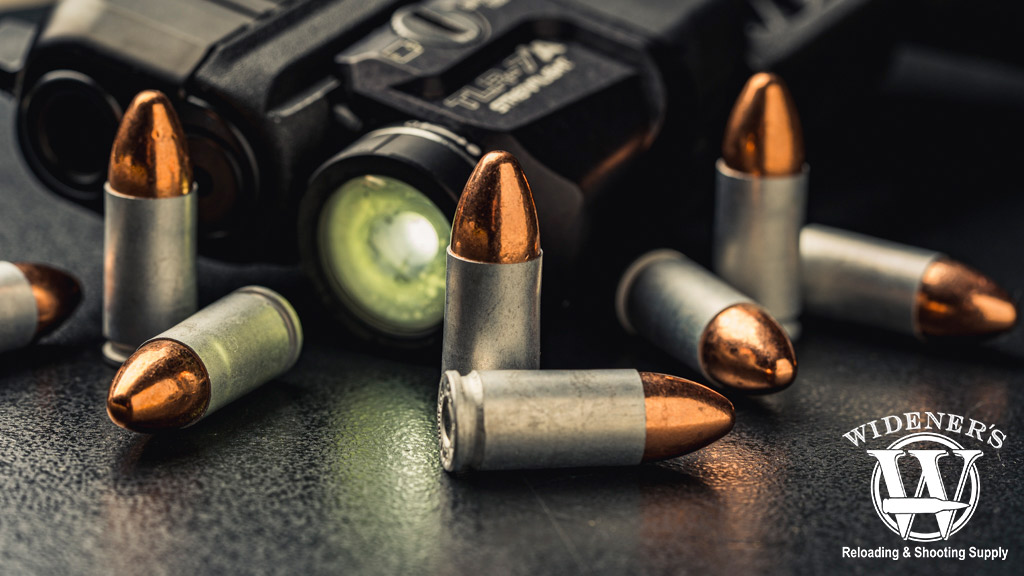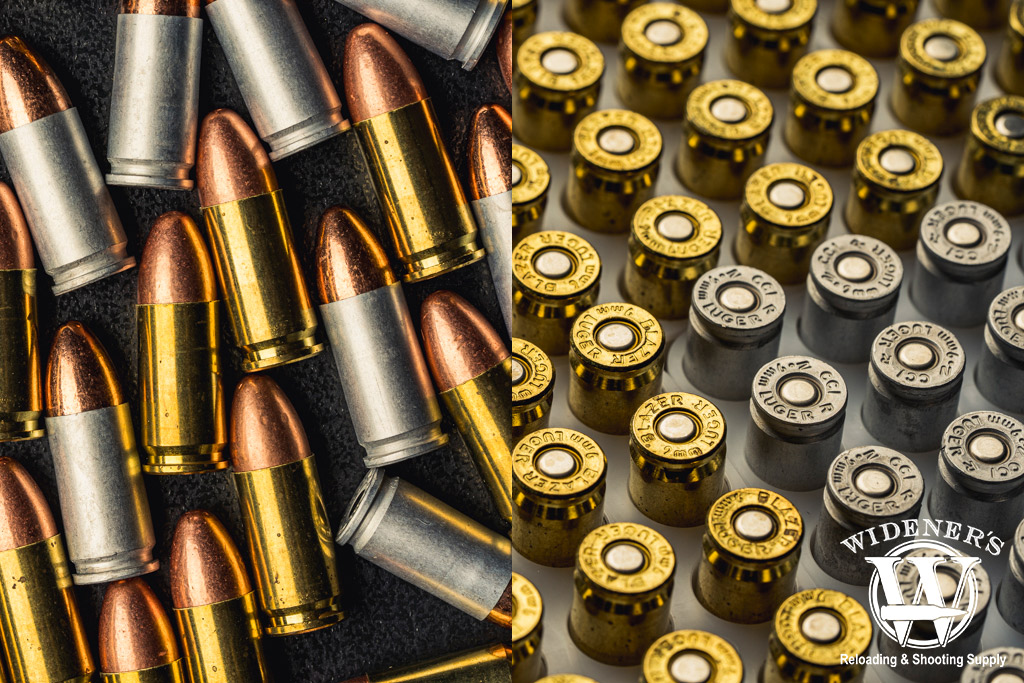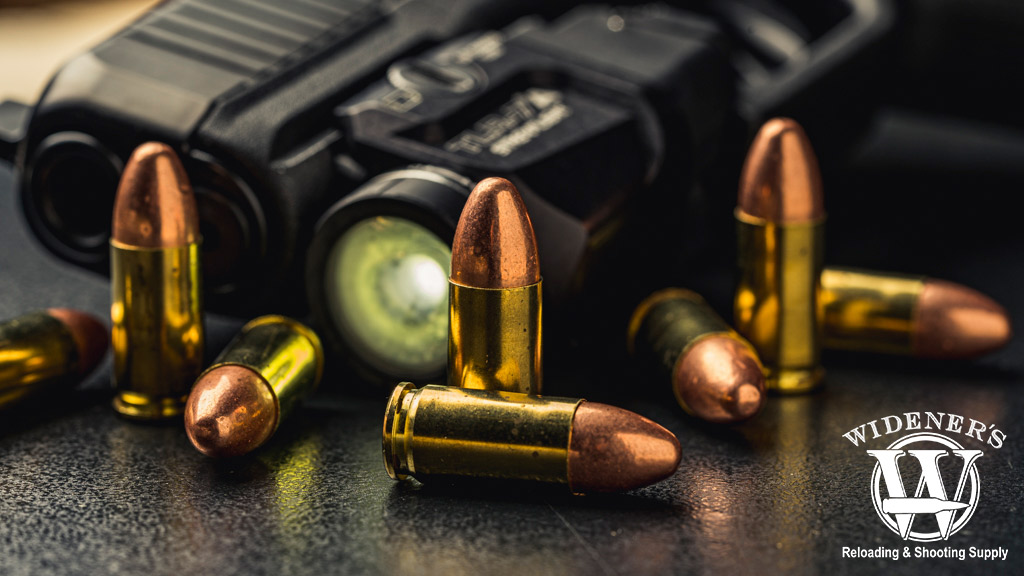

There’s no question that aluminum is a versatile metal. Aluminum is soft and malleable, meaning that it can be forged into a variety of products, including AR-style receivers. However, it does have its limitations. When comparing aluminum vs brass ammo, which metal will come out on top?
Despite the widespread use of aluminum, many firearms owners are still hesitant to use ammunition encased in this non-ferrous metal in their handguns. Instead, they obstinately insist on using only brass ammo, even though doing so can save them anywhere from 10%-30% per box. This trend has led many to wonder, is brass ammo really superior to aluminum?
If you find yourself asking this same question, then you’ve come to the right place. Below, we cut through all of the gun range myths and anecdotal evidence in order to give you a true head-to-head comparison of aluminum vs brass ammo.
Aluminum Cased Ammo

Aluminum-cased ammo is cheaper, allowing you to spend more time at the gun range.
Currently, several major manufacturers are producing aluminum-cased pistol ammunition. The most well-known are Federal Premium Ammunition and subsidiary CCI, via their Blazer line. There are no aluminum-cased rifle cartridges currently in production. Why? The soft metal cannot withstand the high pressures created by this class of firearms.
The fact that these companies with excellent reputations produce aluminum ammo should put you at ease about using this softer casing material in your handgun. I’ll be the first to admit that aluminum cased ammunition has some appealing qualities, which we discuss in greater detail below.
However, that does not mean that aluminum is on equal ground with brass ammo. To be frank, brass ammo is the best casing for pistol ammo, regardless of caliber. The natural characteristics of brass make it especially suitable for withstanding the hot and highly pressurized environment that is created when gunpowder detonates within a weapon’s chamber.
But enough about brass for now. Let’s dive into the specific perks and drawbacks of using aluminum ammo.
Finding Value
Aluminum ammo’s best redeeming quality is that it is cheaper than brass. This has been particularly beneficial in light of recent events, as the price of ammo (and just about everything else) has soared. Many shooters already don’t practice enough and increasing ammo prices have further discouraged them from doing so.
Another perk to using aluminum-cased ammo is that it is lighter. With that said, the weight difference in a 10, 15, or even 20 round pistol magazine is negligible. We are talking about a weight savings of an ounce or two, tops.
Malleability: Aluminum VS Brass Ammo

Brass casings are harder than aluminum, making them less likely to cause a malfunction.
The downside of aluminum ammo is that the metal is not quite as malleable as brass. It can handle the pressures of smaller pistol calibers just fine. However, you should always check your ammo for dents, bulges, and imperfections before loading. A cracked aluminum casing could cause your weapon to have a serious malfunction. It is also generally considered unsafe to reuse any aluminum cartridges for reloading purposes.
However, we classified this drawback as “bad” and not “ugly” because so few shooters actually reload their own ammunition, to begin with. The inability to reuse aluminum ammo casings is a minor inconvenience for a very small percentage of gun owners.
Melting Point
Now time for the big “aha” moment that the anti-aluminum crowd often references when discouraging other gun owners from using this cheap practice ammo. Are you ready for it? Aluminum has a melting point that is about 33% lower than that of brass. Aluminum melts at 1218 F whereas brass melts at about 1700 F.
Once again, those in the anti-aluminum camp will aim to reinforce their opinion by referencing anecdotal stories about a “friend of a friend”. I have heard these tails many times over and they usually end with an aluminum casing melting within the chamber of a handgun. While the chances of this happening are not zero, they are pretty close to being nonexistent.
So, what does the lower melting point actually mean for gun owners? As your gun’s internal parts heat up, there is an increased chance of the aluminum ammo casing over-expanding. This can cause a “failure to eject”, which will prevent your pistol from cycling back into battery.
Clearing a double feed that is caused by a failure to eject is easy enough. However, it can also spell disaster in a real-world self-defense scenario.
Why Brass Is Still King

Brass ammo can be reloaded, can withstand high pressure, and shoots cleaner than aluminum.
There are several distinct advantages to using aluminum vs brass Ammo encased rounds. Brass has a higher melting point, it’s a superior metal, period. A harder casing, able to withstand higher pressure, significantly decreases the chances of a malfunction.
In addition, brass creates a tighter chamber seal. Brass is just malleable enough to expand and fit properly against the walls of your handgun’s chamber. This will keep your gun cleaner, as the tight seal limits how much-unburned powder and gas that blows back into your firearm.
Lastly, brass is safe to use for reloads, if you are into that sort of thing.
In Summary: Aluminum VS Brass Ammo

Aluminum vs brass ammo? Range time with aluminum, brass for when it matters.
To recap, aluminum ammo is a great option if you are looking for cheap practice rounds. Contrary to popular belief, aluminum encased cartridges will not damage the components of your weapon. They will allow more debris and powder to pass back into the weapon, which means you may have to use a little extra elbow grease during your next cleaning session.
Aluminum ammo might also increase the frequency of malfunctions, which can actually make for a great training opportunity. With that said, I do not recommend using aluminum-encased ammo for real-world applications. There is a reason that no major manufacturers produce self-defense rounds with an aluminum casing.
Instead, select a proven cartridge like the Hydra-Shok bullets made by Federal or the Elite V-Crown produced by Sig Sauer. You can’t go wrong with either option.


